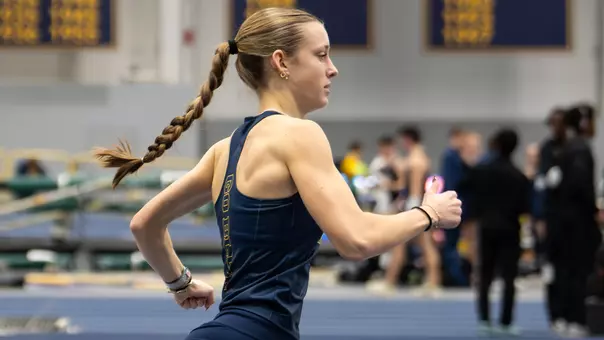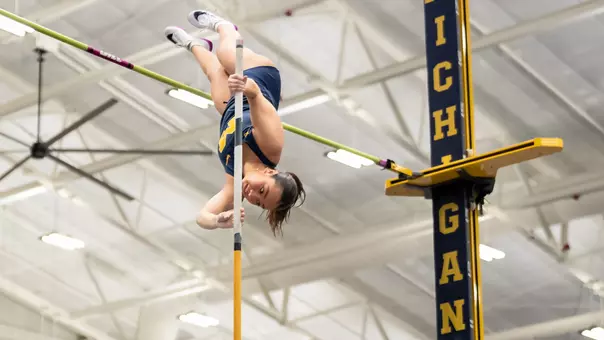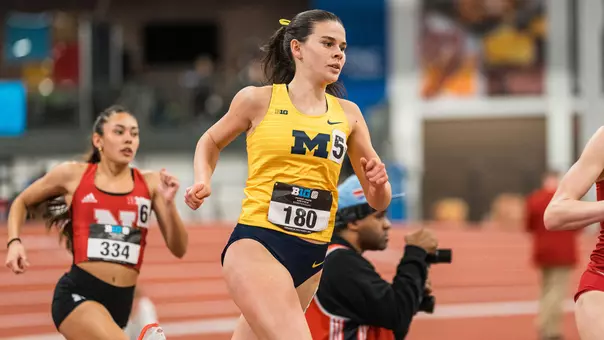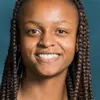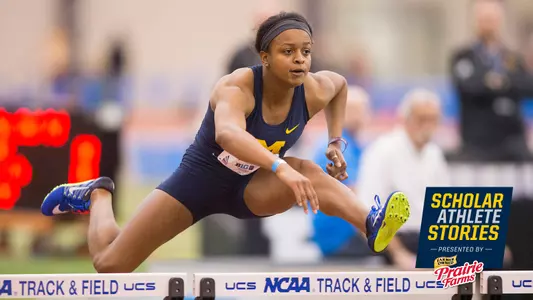
Scholar Stories: Howell Using Platform to Promote Change
1/31/2018 12:31:00 PM | Women's Track & Field, Features
Continuing the popular series that began in 2016-17, each Wednesday MGoBlue.com will highlight a Michigan student-athlete and their academic pursuits. These are our Scholar-Athlete Stories, presented by Prairie Farms.
For some high school students, playing sports in college is the goal; the end-all, be-all of their athletic career. For University of Michigan heptathlete Aaron Howell, though, participating in track and field began more as a social event than a sport.
"I went to track because most of my friends were on the team and it was more just for fun and games," said Howell. "It wasn't until the USATF Junior Nationals in Greensboro, North Carolina, my junior year when I actually started taking it seriously. Then I started getting recruited."
A native of nearby Farmington Hills, Howell always had an idea that she would attend the University of Michigan, but as a student, not an athlete. It was not until she competed in and won the heptathlon at Nationals her junior year that competing collegiately seemed possible.
"It kind of started off with my high school coach. He was the one that coached Bettie Wade, our school record-holder in the multis, and he could just see that we had similar body structures and other similarities," Howell said. "He started throwing me in random events. I didn't mind it at the time. I just liked competing."
One year after an ACL tear that ended her sophomore season prematurely, Howell was back on the track and was stronger than before. At the 2016 Big Ten Outdoor Championships, she took third in the heptathlon and set a new personal record (5,538 points). Howell one-upped that performance last year, as she won the heptathlon with career bests in the 100-yard hurdles (14.03 seconds) and shot put (12.90 meters).
Coincidentally, Howell became the first Michigan woman to win the Big Ten heptathlon title since Wade, who won in 2007.
"That win was a surprise to me and everybody, I feel like. I hadn't been able to finish a full heptathlon that year and I was having difficulties during my indoor season," she said. "Just being able to finish was an accomplishment itself, but winning was a big deal to me. I was really happy."
Howell credits much of her success to her off-field training and rehabbing after suffering the knee injury and battling chronic hamstring issues.
"I spent three hours a day, five-to-six days a week just trying to get back to it," said Howell. "But that motivated me because I saw my closest friends, my teammates, travelling and doing really well. When you see other people do really well, you want to do the same."
While Howell continues to excel on the track and in the field, she is hoping to dive deeper into another one of her passions: social justice.
One of her main goals before walking across the stage at graduation is to address the social issues on campus. As a double-major in both international studies and sociology, Howell is planning to pursue law school once she graduates in April.
Although attending Michigan was an easy decision for Howell, choosing a major took longer than she expected. After taking many core classes, Howell was able to settle on one.
"My junior year I decided to go with international studies because I came in wanting to work with the FBI/CIA-type and so I thought it would be a decent fit," she said. "There was always a part of me that wanted to go to law school, because I was always interested in the crime and justice field, but I didn't necessarily want to be a police officer or anything like that. I always thought there were issues with the criminal justice system and with other institutions, so I figured this would be the best route to take."
Since stepping on campus, Howell continues to use her opportunities as a student-athlete to answer a higher calling of social activism.
 Aaron Howell is not only a champion as an athlete, winning the heptathlon at the Big Ten Outdoor Championships last year, but is a champion for social issues with plans to go law school after graduation.
Aaron Howell is not only a champion as an athlete, winning the heptathlon at the Big Ten Outdoor Championships last year, but is a champion for social issues with plans to go law school after graduation.
But it has not been an easy road. Between studying for the LSAT, taking a full course load and balancing practice and treatments, Howell continues to juggle her academic and athletic pursuits.
Not only is she a student focusing on two different majors, she is also a combined-event athlete who on a daily basis practices upwards of two or three different events.
"Just finding a schedule, it helps me a lot," she said. "I try to wake up early, get homework done, go to practice and then just recover and chill out. It's helped me a lot going into office hours -- I was just able to figure out a schedule."
Aside from her busy school schedule, Howell recently started interning for Terrence Quinn at the TDQ Law Firm in probate law.
"I feel like with law, it sets a standard and it will help create social change in the future," she said. "I see all of these issues here, on campus, every day, and some people don't recognize it because we're not paying attention to it."
Howell hopes to become a sports lawyer advocating for athlete's rights, especially those facing socio-economic issues. While on campus, she continues to voice her opinion in hopes of enacting real, positive change at the university.
"A big thing for me here is that I feel that people with a lower economic status are just shunned down," said Howell. "They miss a lot of opportunities because they don't have the money to participate. Being in a culture where everyone is affluent makes individuals feel like they probably can't even come to this university in the first place."
The first step in addressing this issue, Howell believes, is facilitating meaningful conversations between student-athletes and administration, as well as attracting individuals from all walks of life to the university.
"I feel it's important that the university goes out and starts recruiting students from different backgrounds, not just from a racial standpoint, but also from a socio-economic standpoint."
Howell speaks from experience on such issues, making the cause even more personal and apparent.
"When I didn't get scholarship checks, it was hard, I realized it more then," Howell said. "And for others in that position, you aren't able to go out as often, you can't hang out with friends because you don't have money for food or other items."
Since partaking in the Ross Initiative in Sports for Equality (RISE) and sitting on the panel for the MLK Day Town Hall, Howell has just started to tie together her athletic and academic passions, making a positive impact on the world around her.
It is clear that Howell exemplifies the ideal student-athlete. Her hard work, dedication and relentless pursuit for equality will mirror her exceptional athletic and academic career -- one of adversity and discomfort, but most importantly, of success.

